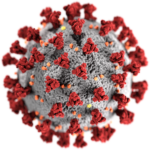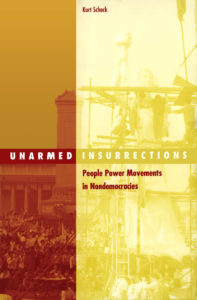 COVID-19 presents us with both our worst public health crisis in a century and the greatest challenge to democracy since World War II, says Stanford’s Larry Diamond, who offers a national strategy to address both challenges in the American Interest.
COVID-19 presents us with both our worst public health crisis in a century and the greatest challenge to democracy since World War II, says Stanford’s Larry Diamond, who offers a national strategy to address both challenges in the American Interest.
Can democracy cope? POLITICO’s Ryan Heath asks. If democratic institutions fail at or over coronavirus, that’s a terrible sign for the slower and more complex challenge of climate change. The comparisons between authoritarian and blended governments and those of the West are rolling in fast. The threats may be direct (to often older political leaders), practical (Parliaments are large groups) or hidden (the absent campaigns and voices). And then there are the naked grabs for power and the misinformation overload.
The contrast between democratic and autocratic efforts to control the virus is may be prompting a new form of ideological competition, observers suggest – and democracy’s victory is far from assured.” A National Review article concludes that “for the time being, China seems to be ahead in the geopolitical game.”
So how can protest movements respond to the challenge of COVID-19? Where should movements turn when gathering people in the streets puts them at risk not just of state repression but of infection? USIP’s Jonathan Pinckney; and Miranda Rivers ask:
 Sociologist Kurt Schock’s study “Unarmed Insurrections” found that movements that were able to shift between tactics that concentrated large numbers of people in a single place, and those that dispersed people across many different locations, like “stay-home strikes” (a particularly apt tactic for pandemic times), were more effective than those that just focused on protests.
Sociologist Kurt Schock’s study “Unarmed Insurrections” found that movements that were able to shift between tactics that concentrated large numbers of people in a single place, and those that dispersed people across many different locations, like “stay-home strikes” (a particularly apt tactic for pandemic times), were more effective than those that just focused on protests.
Democratic governance will play a crucial role in both responding to the COVID-19 pandemic and dealing with the political and economic aftermath, the International Republican Institute’s Molly Salter writes. Institutions grounded in transparency, responsiveness, accountability and the rule of law are better equipped to mitigate public health crises and maintain social and economic stability. At the same time, the crisis has proved a tempting invitation to autocrats around the world to suppress information, sow division and entrench their own power.
The Virtual Policy Briefing Series for Hoover Institution donors, who heard insights from Hoover fellows on COVID-19 and its implications, have now been made available to all friends of Hoover, including:
NIALL FERGUSON
COVID-19 in the Light of History and Network Science
Tuesday, March 31, 2020 | 11:00 am PT | 2:00 pm ET
MICHAEL R. AUSLIN AND LANHEE J. CHEN
COVID-19: China and the Political Fallout
Thursday, April 2, 2020 | 11:00 am PT | 2:00 pm ET
EDWARD P. LAZEAR
COVID-19 and Today’s Jobs Report
Friday, April 3, 2020 | 11:00 am PT | 2:00 pm ET
All briefings can be accessed by registering through this link.







